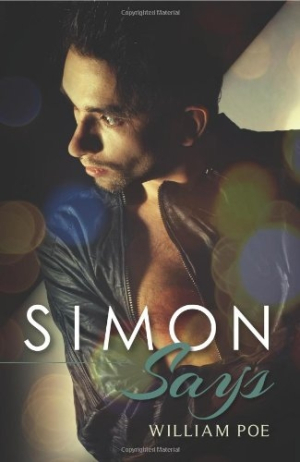Simon Says
In this tale of redemption, gay man Simon Powell navigates through not only drug addiction but also excommunication from the Reverend Sun Myung Moon’s Unification Church. In Simon Says, the author provides a portrait of desperation, inner chaos, and, ultimately, self-awareness.
William Poe, who spent a decade in Moon’s Unification Church and battled addiction and sexual identity issues as a young man, brings a robust dose of autobiography and first-hand experience to Simon Says. Set in the days after Powell leaves the church, the story follows the character’s downward spiral into a gritty world of addiction and confusion. As he tries to rise from the depths, using a movie distribution career as a ladder out of his pain-filled world, Powell reaches a point where he must face his past choices and draw on whatever reserves of inner strength he has left.
In bringing Powell to life, Poe depicts the seedy side of Hollywood’s gay bars in the 1980s, describing hustlers, brawls, and cocaine-fueled nights. Although there are some memorable scenes, Powell’s journey sometimes suffers from a meandering narrative, particularly at the beginning. The story of Powell’s scrapes and squabbles with his friends is told chronologically, which offers a sense of the aimless lives being captured, but not enough to advance the plot in a meaningful way.
Another challenge comes as Powell’s character goes through the motions of a desperate existence but doesn’t offer any indication of deeper feeling, even though the book is a first-person account. Getting a better sense of what Powell feels as he almost bleeds to death on a gurney after a bar fight, for example, would have provided a stronger sense of the character’s inner struggle. Instead, there are just exterior clashes and petty arguments that don’t lead to any larger story lines.
However, once the narrative picks up steam, Poe builds suspense for the twists of Powell’s story. His straightforward writing style contrasts well with Powell’s frequent confusion and self-doubt, providing a solid framework for the character’s emotional range.
The spare prose used to recount Powell’s struggles also works well when Poe delves into broader description or more reflective moments for the character. “When night came, I stopped on the roadside to gaze at the sky,” Poe writes. “I had forgotten the stunning glory of this majestical roof fretted with golden fire, so aptly described by Hamlet. We might be the only creatures capable of pondering the universe. If so, life has meaning due to that very possibility.”
Most compellingly, Poe gives a striking account of what it takes to finally seek help after a soul-crushing decade of drug addiction. While a fuller account of life in the Moonies would have been intriguing, Powell’s journey through post-church days and drug-filled nights is rife with powerful moments.
Reviewed by
Elizabeth Millard
Disclosure: This article is not an endorsement, but a review. The publisher of this book provided free copies of the book and paid a small fee to have their book reviewed by a professional reviewer. Foreword Reviews and Clarion Reviews make no guarantee that the publisher will receive a positive review. Foreword Magazine, Inc. is disclosing this in accordance with the Federal Trade Commission’s 16 CFR, Part 255.

